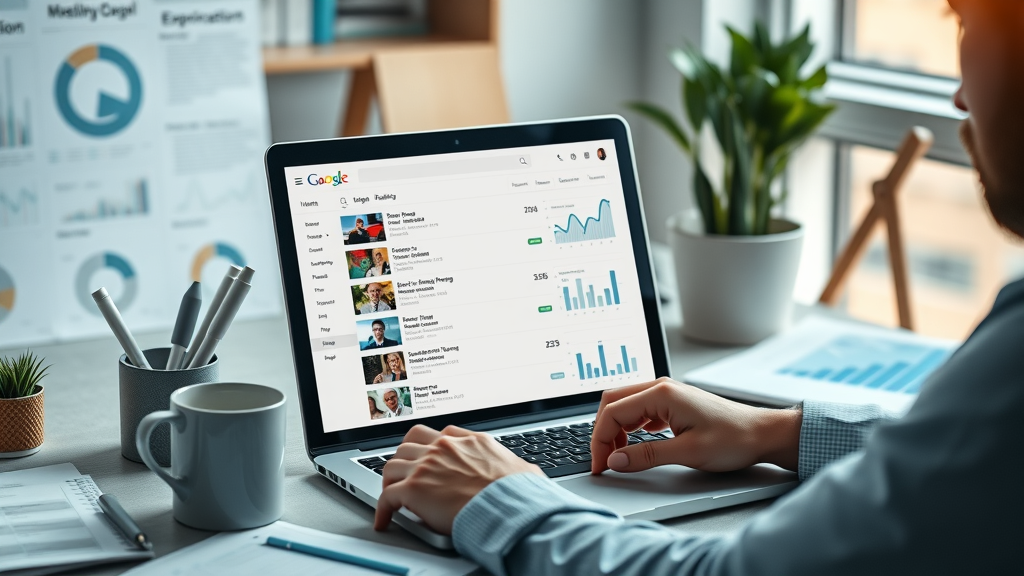"According to recent studies, over 90% of content on the internet receives no organic search traffic from Google at all. Understanding search engine ranking factors could be the key to making sure your content isn’t left behind."
What You'll Learn
- The most crucial search engine ranking factors influencing your website’s SEO rank
- How Google ranking factors and SEO ranking signals shape online visibility
- Real examples, actionable steps, and current trends for effective engine ranking
- How to avoid misconceptions and improve your search ranking today
Unlocking the Essentials: Why Search Engine Ranking Factors Matter
How can you ensure your website is found amidst the billions of web pages on the internet? The answer lies in understanding and applying the right search engine ranking factors . These ranking signals are the algorithms’ way of deciding which pages deserve the top spots in search results. SEO ranking is about more than just keywords; it’s a multi-layered approach involving content, links, user experience, and technical elements—all working together to boost your Google ranking.
Ignoring key SEO ranking factors risks your site becoming invisible. Savvy website owners and digital marketers know that decoding and implementing these engine ranking components can make a tangible difference in organic traffic, site authority, and brand presence. Whether you are trying to climb search engine results for the first time or maintain your lead, mastering these ranking factors is essential for achieving top SEO rank and outperforming competitors.
- Search engine ranking factors impact visibility, site authority, and organic traffic, shaping where your website appears among search results.
- Ignoring SEO ranking factors can lead to missed opportunities, diminished search engine ranking, and lower engagement.
- Decoding ranking factors can help improve your Google ranking and SEO ranking.

Key Takeaways: Core Search Engine Ranking Factors and How They Influence SEO Rank
- Quality content remains the highest valued ranking factor in SEO ranking.
- Internal links and external links directly contribute to higher search engine ranking.
- User experience, page speed, and mobile-friendliness are critical ranking factors in Google ranking and overall SEO rank.
- Domain authority, secure sockets layer (SSL), and website structure are essential for effective engine ranking.

| Ranking Factor | Impact on SEO Rank | Optimization Tips |
|---|---|---|
| Content Quality | Highest | Original, valuable, updated |
| Internal Links | High | Relevant cross-linking |
| Page Speed | High | Compress images, optimize code |
| Mobile Friendliness | High | Responsive design |
| User Experience | Critical | Clear navigation, low bounce rate |
| Domain Authority | Crucial | Build reputable backlinks |
Breaking Down the Major Search Engine Ranking Factors
Content Quality: The Leading Google Ranking Factor
- Google ranking factors emphasize the importance of unique, valuable, and authoritative content.
- SEO ranking factors now reward depth of information and thorough answers to user intent.
- Freshness, keyword relevance, and clear structure play key roles in search engine ranking.
When it comes to Google ranking factors , nothing trumps high-quality content. Search engines seek out content quality that not only answers searcher intent but also delivers original insights, value, and trustworthy information. SEO ranking factors now focus on depth, comprehensive answers, and content relevance to align closely with what users want from search results. To climb the SEO rank ladder, your web page must offer authoritative value above and beyond your competitors.
Freshness is another significant ranking signal. Regularly updating your web pages with timely, accurate information and new research can keep your position strong in search engine ranking . Further, a clear structure—using headers, bullet points, and concise paragraphs—enables engines to parse your content for relevance, further supporting your approach to Google ranking. Remember: truly successful content doesn’t just chase keywords; it fulfills user needs and keeps users engaged, reducing bounce rate and fueling positive SEO ranking factors.

"Quality content is the best SEO investment you can make." – Industry Expert
On-Page Optimization: Internal Linking, Meta Tags, and Semantic SEO Ranking Factors
- Internal linking improves engine ranking by distributing authority and guiding user pathways.
- Effective use of meta titles, descriptions, and header tags, as key ranking factors, enhance SEO rank.
- Structured semantic data boosts search engine interpretation and results placement.
On-page SEO is about refining each web page for maximum relevance and usability. Internal linking is a vital ranking factor that helps distribute link authority throughout your site, keeping users engaged and guiding them to related content. Well-placed internal links also assist search engines in crawling web pages, improving overall search engine ranking . In fact, strong internal linking strategies can dramatically improve your SEO ranking and keep users moving through your site, lowering bounce rate and signaling relevance to Google search.
Meta tags—specifically the meta title and meta description—are more than just an afterthought. Optimizing these fields with your main keyword, additional related terms, and a compelling, informative message enhances click-through rates from the search results page. Additionally, utilizing semantic SEO elements such as schema markup helps search engines understand your site content contextually, further boosting engine ranking and SEO ranking factors . Structured semantic data can lead to enhanced results on the engine results page, including featured snippets and rich results.

Technical SEO: Page Speed, Mobile Optimizations, and Secure Connections
- Page speed is a primary Google ranking factor—fast-loading pages keep users engaged and lift search rankings.
- Mobile-friendly websites meet Google ranking factors for all device types.
- SSL certificates and secure protocols have become critical SEO ranking factors for trust and safety.
Technical SEO ranking factors are the backbone of site performance and accessibility. Page speed is often considered one of the most critical ranking signals for Google search —slow-loading pages push visitors away and spike your bounce rate, sending negative signals to search engines. Employ best practices such as compressing images, streamlining code, and minimizing redirects to supercharge your site speed and secure a better spot in search rankings.
Today, mobile optimization is a non-negotiable ranking factor. With the majority of users browsing on mobile devices, Google’s algorithm prioritizes mobile-friendly websites in search engine results. Responsive design, touch-friendly navigation, and visual clarity across devices are essential for maximal SEO rank . Furthermore, implementing SSL certificates ensures your site’s data is transmitted securely—a key SEO ranking factor that’s crucial for both user trust and engine ranking in the age of privacy concerns.

Off-Page SEO Ranking Factors: Authority, Backlinks, and Social Signal Impact
- Reputable backlink profiles are major ranking factors in search engine ranking.
- Social signals can indirectly boost SEO rank and organic search results.
- Domain authority combines multiple google ranking factors reflecting overall site trust.
Securing a strong position in search results is not just about on-page elements; off-page signals are equally important. Backlinks—from reputable, relevant sites—serve as vouches of trust and are a well-established Google ranking factor . The more high-quality backlinks your site earns, the stronger your domain authority becomes—a vital aspect of competitive engine ranking . A well-developed backlink strategy not only helps climb the SEO ranking ladder but also protects against volatility in search algorithms.
Social media presence and activity, while not direct ranking signals, can indirectly influence SEO rank. The amplification of your content through social platforms increases visibility, earning more links, engagement, and recognition across the digital landscape. Together, these off-page ranking factors solidify your authority, making it harder for competitors to unseat your site from top search engine ranking spots.

Advanced Google Ranking Factors: Algorithm Updates and User Experience Signals
- Algorithms like Google’s BERT and RankBrain have shifted focus to intent-based search engine ranking factors.
- User experience metrics—bounce rates, time on page—strongly influence SEO ranking.
- Technical issues, like crawl errors and broken links, can harm search engine ranking.
Google’s evolution means search engine ranking factors adapt rapidly. Recent updates like BERT and RankBrain have shifted the focus from traditional keyword matching to understanding user intent. As a result, user experience has risen as a primary ranking factor . Metrics such as bounce rate, session duration, and number of pages visited have a direct influence on your site’s SEO rank, as they reflect how satisfied users are with your web page content.
Technical obstacles remain a consistent threat to engine ranking . Crawl errors, broken internal links, and outdated site structures disrupt search engines from fully indexing and ranking your site. Prioritizing site health through regular SEO audits and prompt fixes ensures you’re not losing SEO ranking ground due to avoidable technical hiccups. Remember, the modern search landscape is user-first—sites that anticipate user intent and deliver seamless navigation are rewarded by Google ranking factors and high positions in the search results.

Search Results Analysis: How Leading Sites Achieve Top SEO Ranking
- Examine the top ranking factors behind leading search engines and high-performing sites.
- Dissect content quality, technical optimization, and backlink strategies in successful SEO ranking.
- Assess the role of user experience and intent fulfillment in dominating competitive search results.
Ever wondered why sites like Wikipedia, Amazon, or Moz consistently dominate search engine results? A careful examination reveals that these high performers excel not only in content quality but also in technical optimization, user experience, and robust backlink profiles. Their approach to Google ranking factors is holistic—they update content frequently, optimize every web page, and secure relevant backlinks to build authority in their niche. Continuous assessment and improvement is embedded in their DNA, making them resilient to algorithm changes.
Moreover, these leaders prioritize user experience at every turn. From lightning-fast page speed to mobile-first design and clear navigation, everything is built around exceeding the expectations of both users and search engines. By striving for intent fulfillment, these sites achieve near-universal trust and higher SEO ranking—making them almost unassailable in competitive search results. Their strategies are a blueprint for anyone seeking to elevate engine ranking and maintain prominence in an ever-changing SEO landscape.

| Website | SEO Rank | Highlighted Ranking Factor |
|---|---|---|
| Wikipedia | 1 | High-quality, authoritative content |
| Amazon | 1 | User experience & fast page speed |
| Moz | 1 | Backlink profile & domain authority |
Optimizing for Search Engine Ranking: Actionable Steps for Better SEO Rank
Building Quality Content That Attracts Search Engines
- Develop content targeting user queries and relevant keywords for higher search engine ranking.
- Restructure existing content for clarity and keyword optimization—an important SEO ranking factor.
- Add multimedia and visuals, which are positive ranking factors in modern SEO ranking.
Quality content creation should be the foundation of any SEO strategy. Start by mapping out common user queries and naturally weaving high-intent keywords throughout your web pages. Employ keyword research tools to identify low-competition, high-value topics, and structure your content to address them fully. This approach aligns with modern SEO ranking factors and resonates with user intent, propelling your site higher in the results page.
Don’t stop at new content. Audit and revamp existing pages to maximize clarity, keyword presence, and structural coherence. Consider adding multimedia—images, videos, infographics—to improve engagement, reinforce key messages, and meet next-level ranking signals . These tactics amplify dwell time and decrease bounce rate, which search engines look for as strong indicators of content quality and relevance.

Technical Enhancements to Bolster Google Ranking Factors
- Audit page speed, fix bottlenecks, and optimize image sizes for faster loading.
- Ensure site is mobile-responsive and provides a seamless user experience for enhanced SEO ranking factor benefit.
- Add structured data to improve search result appearance and engine ranking potential.
Technical optimization remains one of the most overlooked yet impactful SEO ranking factors. Regular page speed audits—using tools like Google PageSpeed Insights—can pinpoint load time issues, code bottlenecks, and large image files slowing your web page. Addressing these quickly improves site speed and sends positive ranking signals to the search algorithm. Every split second of improvement counts for both users and search engines .
A mobile-responsive design is now table stakes for a healthy engine ranking . Test your site on various screen sizes and devices—including tablets and smartphones—to ensure a seamless experience everywhere. Lastly, implement schema markup and structured data elements to clarify your content’s context, enhancing its appearance in the engine results page. Rich snippets, product ratings, and other enhancements can lift your click-through rate and search visibility dramatically.
Backlink Building and Authority Growth for Long-Term Ranking Factors Success
- Create authoritative resources worthy of backlinks—an established google ranking factor.
- Engage in outreach and build partnerships to strengthen your domain’s SEO ranking factor profile.
- Monitor and disavow toxic or spammy backlinks regularly for stable search engine ranking.
Building a library of genuinely valuable resources is a magnet for backlinks—a major Google ranking factor . These could be in-depth guides, thought leadership articles, or interactive tools that others want to reference and share. Next, proactive outreach—guest posting, digital PR, partnerships—will widen your network and secure fresh, high-quality backlinks, directly improving your domain’s authority and SEO ranking factors .
It’s equally important to keep your backlink profile clean. Use tools to audit for toxic or spammy links and submit disavow files to Google when necessary. By protecting your site’s authority, you enhance your position in the search engine ranking landscape, creating a strong, enduring SEO foundation.

Common Misconceptions About Search Engine Ranking Factors
- Misunderstanding Google ranking factors and over-focusing on outdated tactics can harm SEO rank.
- There’s no single magic ranking factor: success requires comprehensive optimization for all ranking factors.
- Debunking persistent myths about keyword density and hidden text as effective SEO ranking factors.
It’s a mistake to chase after a single, “magic” SEO ranking factor or to depend on outdated techniques such as keyword stuffing or hidden text. Modern search engines are sophisticated; focusing only on keyword density or meta tags, while ignoring site speed, backlinks, or user experience, is a surefire way to miss the mark on search ranking . In reality, Google ranking factors are interdependent—a well-rounded approach always outperforms tunnel vision strategies.
Another myth is that social media activity directly boosts SEO rank. While social media can increase visibility and build brand recognition, it’s the resulting links, engagement, and content signals that indirectly impact engine ranking. Finally, any tactics that attempt to deceive search engines—like cloaking or doorway pages—can result in penalties, undermining all your SEO efforts. Focus on long-term SEO ranking factors and steer clear of quick fixes and obsolete practices.
The Future of Search Engine Ranking Factors: Trends and Predictions
- AI-driven search engines are redefining the future of search engine ranking and SEO rank.
- Anticipate new ranking factors prioritizing real user experience and intent satisfaction.
- Evolving Google ranking factor algorithms will emphasize content quality and authority more than ever.
The landscape of search engine ranking factors is rapidly evolving thanks to advances in AI, machine learning, and natural language processing. Algorithms now grasp nuance, context, and intent, raising the bar for content quality, authenticity, and depth. AI-powered features will reshape how ranking signals are weighted, with more emphasis on fulfilling user expectations in real time.
Going forward, expect Google ranking factors to be even more user-centric. Real engagement, helpfulness, and intent alignment will continually trump cheap tricks or surface-level optimization. Invest in your user experience, keep pace with search engine updates, and focus on creating genuinely authoritative resources that serve your target audience. Staying proactive and adaptable is the ultimate strategy for future-proof SEO ranking .

Frequently Asked Questions on Search Engine Ranking Factors and SEO Ranking
What determines search engine ranking?
- Several ranking factors determine search engine ranking, including content quality, backlinks, user experience, and technical elements like page speed and site structure.
Search engines analyze hundreds of factors to decide where your web page appears in search results . The most influential are content quality, relevant and reputable backlinks, positive user experience (such as mobile responsiveness and fast page speed), and robust website structure. Consistently optimizing these ranking signals will drive your site higher in the results page.
What are the search engine land ranking factors?
- Search Engine Land outlines ranking factors like content, on-page SEO, authoritative backlinks, mobile optimization, and technical stability as critical for top search engine rankings.
The most referenced search engine ranking factors from industry authorities include unique content, on-page elements (headers, meta description, and internal links), a strong backlink profile, and technical foundations (site speed, security, and mobile-friendliness). All hold equal importance for achieving and maintaining a top SEO rank .
What are the top 3 ranking factors of Google?
- The most influential Google ranking factors are content quality, backlinks, and user experience (including page speed and mobile-friendliness).
Google considers quality content , authoritative backlinks, and a stellar user experience as its three pillars of ranking. If you consistently focus on these areas, you’ll be poised to win in modern search engine results and achieve a higher SEO ranking than competitors.
What is a ranking factor in SEO?
- A ranking factor in SEO is an attribute or criterion that search engines use to evaluate and rank web pages in search results, ranging from content quality to the number of quality backlinks.
A ranking factor is any signal that helps search engines decide where your page appears in the engine results page . Examples include the usefulness of your content, technical health of the site, the authority of your backlink profile, and signals derived from user engagement. Each factor contributes to your overall SEO ranking and visibility online.
Key Takeaways for Mastering Search Engine Ranking Factors
- Pay close attention to all major ranking factors: content, technical SEO, internal linking, and authority building.
- Regularly update your SEO strategy to align with evolving google ranking factors and algorithm changes.
- Invest in user experience, site speed, and high-quality content to maintain optimal search engine ranking.

Start Optimizing: Take Control of Your Search Engine Ranking Factors and Elevate Your Website’s SEO Rank Today
Don’t leave your visibility to chance. Begin implementing the strategies and signals outlined above, and take charge of your search engine ranking factors to unlock sustained SEO ranking growth for your website.
To deepen your understanding of search engine ranking factors, consider exploring the following authoritative resources:
- “Top 10 Search Engine Ranking Factors: Tips for SEO Success”
This article provides a comprehensive overview of the most influential factors affecting search engine rankings, including content quality, backlinks, and user experience. ( singlegrain.com )
- “Google Ranking Factors for 2025 (The 10 Most Important)”
This resource outlines the top ten ranking factors for 2025, offering insights into how elements like website loading speed, mobile friendliness, and domain authority impact your site’s SEO performance. ( monsterinsights.com )
By delving into these resources, you’ll gain valuable insights into optimizing your website to achieve higher search engine rankings.
 Add Row
Add Row  Add
Add 






Write A Comment